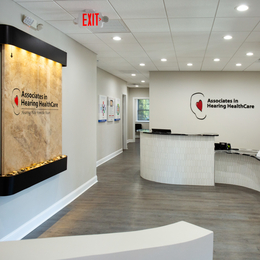
“I may not hear as well as I used to, but it’s not a big deal.” “Hearing loss is a natural part of aging.” “I’m too young for a hearing aid.”
Rosario Saad, Au.D., has heard it all in terms of people’s attempts to explain away their untreated hearing loss. As clinical director of Associates in Hearing HealthCare, her goal is to undo the myths surrounding hearing loss and the devices used to treat it. She also wants to help people understand the broader risks associated with letting hearing loss go unchecked.
“Hearing loss is about much more than not being able to hear sounds in your environment,” says Dr. Saad, a third-generation healthcare provider who has a doctorate in audiology and a bachelor’s degree in psychology. “When you experience hearing loss, the auditory cortex needs help and pulls energy from other areas of the brain to compensate, and that can lead to cognitive overload.”
In other words, hearing loss has the potential to impair—if not imperil—the brain’s overall health. Besides unwanted biological changes, hearing loss can negatively affect a person’s life in countless other ways: the steady withdrawal from social interactions, stressed relationships with friends and family, the inability to enjoy life-enriching hobbies and activities, etc.
Dr. Saad and her colleagues are eager to help. Associates in Hearing HealthCare’s five-person audiology team specializes in helping patients of all ages, from infants with congenital conditions to older adults in need of auditory rehabilitation.
“Every person should get a baseline hearing test around the age of 40,” Dr. Saad says. “The majority of our patients are 45 and older, but hearing loss affects people of every age: those who were born with auditory issues, those who have genetic hearing loss, and those who have noise- or trauma-induced hearing loss. We also see people with hidden hearing loss, which means their audiogram shows normal thresholds but they struggle to process sounds and speech.”
Dr. Saad cites an array of innovative treatment options, including daily-wear and extended-wear hearing aids such as Lyric, a completely invisible hearing aid placed in the ear canal. Some patients may be better served by cochlear implants to stimulate the auditory nerve; the implants involve a minor surgical procedure performed by a specialist from Penn Medicine.
“There’s no such thing as ‘one size fits all’ when it comes to treating hearing loss,” Dr. Saad adds. “Some people have dexterity issues or cognitive issues, which may determine which kind of hearing aid is most appropriate. You also have to consider the configuration of a person’s hearing loss and the functionality of the device, such as rechargeability and Bluetooth.
“It’s really important to have a good rapport between the patient and the audiologist, because there’s a lot of flow back and forth,” she continues. “In the first 30 days, you’re going to see me three or four times to make sure you’re hearing well and the hearing aid is fitting well. A lot of it involves setting expectations, counseling, and aural rehabilitation. After we confirm the prescription and the patient feels comfortable, we meet with them every six months.”
Associates in Hearing HealthCare offers regular walk-in hours at both locations for hearing-aid maintenance and cleaning to keep patients’ instruments performing at peak level. In addition, the practice supports patients’ overall brain health through screening tools such as Cognivue, which can detect evidence of cognitive decline in need of treatment. In addition, audiologists prescribe at-home exercises to optimize sound stimulation and constantly reinforce the importance of wearing hearing aids at least eight hours a day.
“It’s almost like physical therapy for your ears,” Dr. Saad says. “It’s an imperfect analogy, but think of it as going from using a walker to running a marathon. You’re taking small steps and strengthening those muscles over time. The same is true with treating hearing loss.”
Dr. Saad has been heartened by the growing body of evidence supporting the idea that hearing aids can slow the onset and progression of cognitive decline. Even so, she believes more work still needs to be done to address the lingering stigma associated with hearing aids.
“My goal is to have people relate to hearing aids the way we think of corrective lenses,” she says. “You have a sense that’s not working at an optimal level, and a properly prescribed device can help. Our job is to prescribe treatment that will help you hear as well as you can, and also keep your brain as healthy as possible for as long as possible.”
Associates in Hearing HealthCare
www.Ears4You.com | (888) EARS-4YOU
121 Clements Bridge Road, Barrington
502 Sheppard Road, Voorhees
Published (and copyrighted) in Suburban Family Magazine, Volume 12, Issue 11.
For more info on Suburban Family Magazine, click here.
For information about advertising in Suburban Family Magazine, click here.
To find out where to pick up your copy of Suburban Family Magazine, click here.




